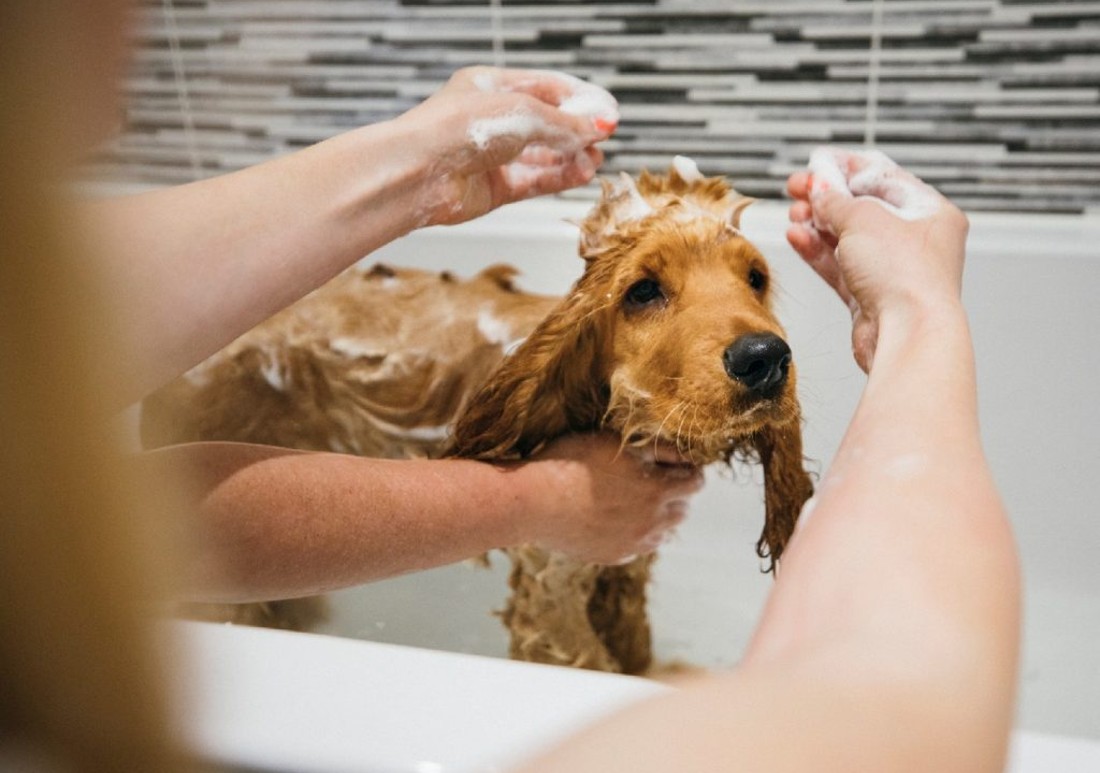Dog Shampoo: The Different Types and When To Use Them

Dog shampoo is essential for keeping their fur and skin healthy, so it’s important to find one that’s compatible with your furry pal. But, finding the right shampoo for your pup can be a challenge, especially with the wide range of options available on the market these days. Different types of shampoos have different purposes, and understanding the differences between them can help you make a smart decision about which shampoo is best for your pup.
In this article, we’ll discuss several different types of dog shampoos, their benefits, their drawbacks and when you should use them. Plus, we’ll also discuss ingredients and how often you should actually be bathing your pup.
Different Types of Dog Shampoos
The first step to grooming your pup is selecting the appropriate shampoo. There are several different types of dog shampoos on the market that range from medicated pet shampoos to natural alternatives like oatmeal shampoo.
Medicated Pet Shampoo
Medicated pet shampoos usually have a formulation with active agents like sulfur and salicylic acid to tackle common canine skin problems like fleas, mites, yeast infections or hot spots. The ingredients in these shampoos can help reduce skin irritation and itching and may also target specific conditions. Always use these kinds of shampoos by following the directions carefully and only when skin issues arise. It’s best to avoid them if there is no medical condition present.
Oatmeal Shampoo
Dogs with sensitive skin or allergies may benefit from using a natural oatmeal shampoo that contains added moisturizers like honey or aloe vera. Oatmeal has anti-inflammatory properties, which can help soothe skin irritation. Plus, oatmeal is a great option for dogs who suffer from seasonal allergies as well as those who have dry or itchy skin from atopic dermatitis. A reliable oatmeal-based product will contain colloidal oatmeal instead of just ground oats since it is more effective for calming itchy skin.
Dog Flea Shampoo
Dog flea shampoo can kill fleas on contact and prevent re-infestation. This type of shampoo typically contains insecticides such as pyrethrins, permethrins or sulfur compounds, so use caution when selecting one and read product labels carefully to ensure that it’s safe for your pet’s specific needs. Usually, these shampoos don’t require you to leave them on the fur for very long (around five minutes) — just make sure to keep the lather away from the eyes and ears while bathing your pup.
Tips for Choosing the Right Shampoo for Your Dog
Choosing the right type of shampoo for your pup depends on their individual needs as well as any medical conditions they may have. When selecting a shampoo for your dog, take into account factors like skin sensitivity, oily or dry coats, existing medical issues like fleas or hot spots and known allergies before deciding. Here are some other helpful tips to keep in mind when selecting a shampoo:
Ingredients To Look For
When looking at any type of dog shampoo ingredients list look for natural products like coconut oil or aloe vera to provide added hydration and soothing benefits. Also, check out shampoos that can help calm irritation and promote healing in the skin without drying out their coat too much. Additional vitamins or minerals in the ingredients list can provide great nourishment for your pooch’s coat and overall health as well.
Ingredients To Avoid
There are certain ingredients to avoid when purchasing dog shampoo such as parabens since these chemical preservatives can cause health concerns in both humans and animals alike. Also, keep an eye out for artificial fragrances which can cause rashes or allergic reactions in some sensitive pups. Natural oils such as lavender oil are much better options than artificial fragrances if you want a pleasant-smelling pooch!
Regular Bathing for Dogs
It’s important to note that while all dogs need baths occasionally, they don’t necessarily need one every week unless they get particularly dirty. Bathing too often can strip their fur of its natural oils leading to dryness, itching or other issues with their coat health.
A good rule of thumb is bathing monthly (or at least once every three months) with a mild, non-detergent-based shampoo that won’t strip away too many of their necessary oils. Be sure to follow up with a conditioner afterward, especially if your pup has particularly dry fur.
Keep in mind that it’s always best to consult with your vet prior to making any changes in your grooming pet’s routine, especially due to an underlying medical condition your pup may have (such as frequent episodes of hot spots or fleas).
Conclusion
Selecting the right type of shampoo for your pup is essential for ensuring their coat and skin remain healthy. Different types of shampoos have different benefits and drawbacks, so it’s important to understand which one is best for your pup. With all this knowledge, you should now be able to select the perfect shampoo for your four-legged pal!
Your Pet’s Best Interest, Always
At Pet Institute, we take pet care seriously. We're dedicated to transparency, impartiality, and the well-being of your pets in every article, review, and recommendation we provide. Our unwavering commitment to these principles ensures that you, our valued reader, always receive reliable and unbiased information. Let us be your trusted guide in the world of pet care and companionship.